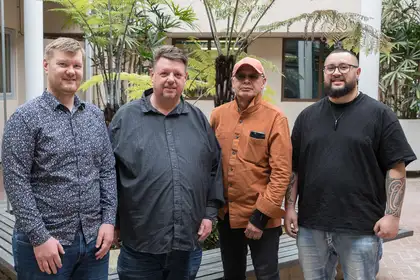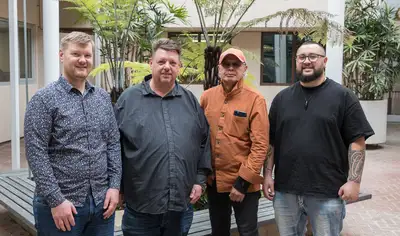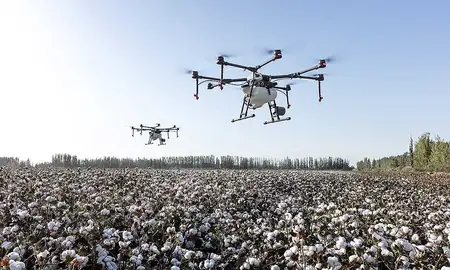
The Kōwhaiwhai project team (L-R): Dr Eli Gray-Stuart, Professor John Bronlund, Professor Robert Jahnke, and artist Maihi Potaka have received Endeavour funding for their biomaterial packaging project.
The funding is part of MBIE’s Endeavour Fund, and was announced by Research, Science and Innovation Minister Dr Ayesha Verrall. Funding was awarded to 71 projects across the country, totalling $236.5 million.
Four of Massey’s five successful projects come out of the College of Sciences, and one is jointly led by staff from the College of Creative Arts and the College of Sciences.
Provost Professor Giselle Byrnes says she is immensely proud of the success of Massey staff in the latest funding round. “Each of these projects speaks to a key goal of our new University Strategy, Pou Rangahau, where we have committed to demonstrating research excellence, applying our world-class expertise to solve contemporary societal challenges and to delivering real and lasting benefits to Aotearoa New Zealand.”
The successful projects
Smart Capacitive Sensing Floors for Smarter Homes
Associate Professor Fakhrul Alam’s from the School of Food and Advanced Technology has been awarded $999,991 for his project Smart Capacitive Sensing Floors for Smarter Homes.
He is teaming up scientists and engineers from Scion, Resene, and three other New Zealand universities to develop an innovative Smart Floor capable of making homes and aged-care facilities safer. For example, the floor could detect a body lying motionless and instantly alert hospitals and relatives to a fall. A future application of the floor could see it track an occupants’ footsteps and calculate that a walking pattern has changed, which would then alert the family doctor to investigate early onset of a disease like Alzheimer’s.

Associate Professor Fakhrul Alam.
Robotic Capsule to Advance Management of Gastrointestinal Diseases
Senior Lecturer Dr Ebu Avci from the School of Food and Advanced Technology has been awarded $1 million for his project Robotic Capsule to Advance Management of Gastrointestinal Diseases.
Dr Avci is teaming up with engineers to develop a revolutionary smart robotic capsule that is minimally invasive, remotely deployable, able to access the entire gastrointestinal track, and collect images/samples of luminal content and gut wall. This technology will advance the management of gastrointestinal diseases by enabling early accurate diagnosis, less invasive ongoing monitoring of treatment efficacy, and lower rates of complications. World-leading microfabrication and biomedical device instrumentation expertise will combine to develop a fit-for-purpose pill-sized capsule with innovative micoactuators and sensors that allow precise positioning and sampling within the gut.
The interdisciplinary team working on this project includes engineers, specialist gastrointestinal clinicians, nutrition and gut physiology experts, biomedical device entrepreneurs, and Māori advisors, representing three universities, one Crown Research Institute, a hospital, and private businesses.

Dr Ebu Avci.
Enlisting Kākahi: developing a model system to protect Māui dolphins from toxoplasmosis
Professor Wendi Roe from the School of Veterinary Science has been awarded $999,999 for the project Enlisting Kākahi: developing a model system to protect Māui dolphins from toxoplasmosis.
Toxoplasma, a parasite carried by cats that sheds in their faeces, has been identified as a major risk factor threatening the critically endangered Māui dolphin. One particular strain of this parasite is responsible for Māui and Hector’s dolphin deaths, as well as for deaths of native birds, and a crucial challenge is to work out when and where the parasite gets into waterways.
Professor Roe’s research will use information on land use, weather conditions and cat host population to get a clearer picture of the parasite’s transmission pathways from land to sea, and create a machine learning model that can predict exposure hotspots.
The knowledge gained can be used to target disease management at the most relevant areas, with an ultimate aim of decreasing the amount of Toxoplasma entering our waters, and preventing Māui dolphin deaths. The research team will actively engage with a Research Advisory Group of end-users, including mana whenua, regional council staff and wildlife managers, throughout the project.

Professor Wendi Roe.
Kōwhaiwhai pūtoi koiora – Kōwhaiwhai based biomaterial packaging
Professor John Bronlund from the School of Food and Advanced Technology and Professor Robert Jahnke from Toioho ki Āpiti, Māori Visual Arts, have been awarded $1 million for collaborative project Kōwhaiwhai pūtoi koiora – Kōwhaiwhai based biomaterial packaging.
Through kōwhaiwhai artist Maihi Potaka, and in collaboration with packaging and materials engineering at Massey, Scion, and Callaghan Innovation, this project will develop packaging applications of kōwhaiwhai that are consistent with its use, while positively promoting and embracing Māori culture.
This research will develop science-based methodologies to design kōwhaiwhai-based materials with unique and tailored mechanical functionality, the ability to embed an underlying narrative, universally acknowledge Aotearoa New Zealand's prominence, are made from sustainable materials, and protectable under trademark and copyright acts.

The Kōwhaiwhai project team (L-R): Dr Eli Gray-Stuart, Professor John Bronlund, Professor Bob Jahnke, and artist Maihi Potaka.
Robust volcanic eruption forecasts: leveraging magmatic speedometry into geophysical monitoring
Professor Georg Zellmer from the School of Agriculture and Environment has been awarded $999,972 for his project Robust volcanic eruption forecasts: leveraging magmatic speedometry into geophysical monitoring.
The research project seeks to help answer the difficult question of when a volcano will erupt, following the identification of volcanic unrest. The question is difficult to answer because the interpretation of monitoring systems requires a comprehensive understanding of the magmatic processes that precede an eruption. A three-staged approach will be taken to study historical seismic records prior to previous eruptions to characterise the signals, forward-model volcano deformation using various magma volumes and geometries, and extend magma ascent analysis to eruptions that produce voluminous lava flows.
The work will have transformational impacts during future episodes of volcanic activity, where it will significantly contribute to saving lives, reducing injuries, protecting livestock and infrastructure, and enhancing environmental remediation.
The Endeavour Fund is New Zealand’s largest contestable funding system to select excellent research proposals that will provide the highest potential impacts across a range of economic, environmental and societal objectives to transform our future.
The successful proposals for the 2022 Endeavour Fund were selected by the Science Board, an independent statutory Board, following review by independent experts from New Zealand and overseas.
The new contracts start on 1 October 2022.
Related news
Massey researchers awarded more than $13 million in MBIE funding
Three Massey University researchers have secured more than $13 million in funding, from the Ministry of Business, Innovation and Employment Endeavour Fund.

MBIE funding awarded to researchers for innovative, cutting-edge projects
Four projects led by Massey University researchers have been awarded more than $12 million in the Ministry of Business, Innovation and Employment's (MBIE) 2021 Endeavour Fund.

New research funding will help to address future needs of New Zealand
Massey researchers are the recipients of MBIE funding worth more than $15.4 million.
